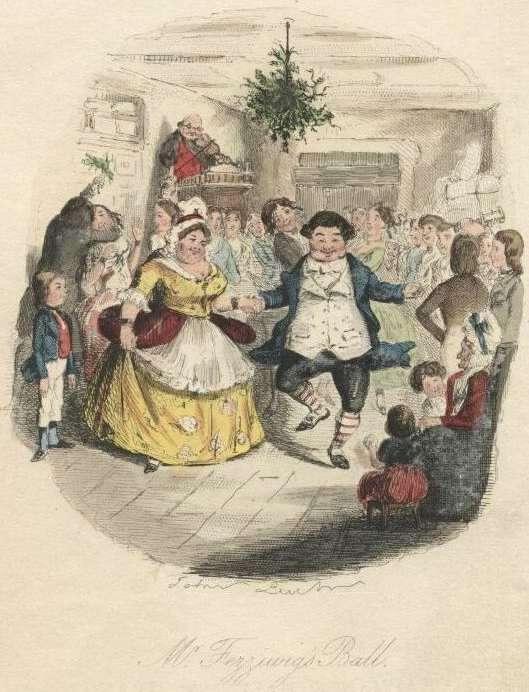Ten Things To Know About Charles Dickens' A Christmas Carol

Mr. Fezziwig’s Ball, Hand colored etching by John Leech from A Christmas Carol by Charles Dickens, via Wikimedia Commons
"Marley was dead, to begin with." With those six words, Charles Dickens invited us into the world of A Christmas Carol, indelibly introducing us to Ebenezer Scrooge, the three ghosts of Christmas, Tiny Tim, and a full cast of memorable characters. Though he spent mere weeks writing it, Dickens' novella about the original Christmas grinch has been a holiday staple for nearly two centuries, giving rise to countless adaptations for stage and screen. It was such an immediate hit, that barely a month after its debut, Dickens was embroiled in a legal fight against a publishing company that had printed pirated copies.
In the spirit of the season, here are 10 things you may not know about the Christmas classic, including its original title, what happened to the original handwritten draft, and a rather famous American author who was not at all a fan.
Did you know… A Christmas Carol was just one of several Christmas-themed stories written by Charles Dickens. The novella’s full title is A Christmas Carol. In Prose. Being a Ghost Story of Christmas.
Did you know… Dickens wrote A Christmas Carol in just six weeks, under financial pressure. Reportedly Dickens wrote the story while taking hours-long nighttime walks around London.
Did you know… A Christmas Carol was first published on December 19, 1843, with the first edition sold out by Christmas Eve. By 1844, the novella had gone through 13 printings and continues to be a robust seller more than 175 years later.
Did you know… Dickens didn't make very much money from early editions of A Christmas Carol. Though it was a runaway best seller, Dickens was very fastidious about the endpapers and how the book was bound, and the price of materials took a big chunk out of his potential profits.
Did you know… Like many of Dickens’ other works, A Christmas Carol was written as a work of social commentary. Dickens had a lifelong devotion to helping the underserved due to his own family’s experiences with debtors prison, which forced him to drop out of school as a boy and work at a factory. As Dickens’ biographer Michael Slater described, the author thought of A Christmas Carol as a way to, “help open the hearts of the prosperous and powerful towards the poor and powerless…."
Did you know… Upon publishing the first edition of A Christmas Carol, Dickens had his 66-page heavily revised handwritten manuscript bound in crimson leather and decorated in gilt before gifting it to his friend—and creditor—Thomas Mitton, whose name was also inscribed on the cover in gilt. You can see a digital copy of the manuscript on the Morgan Library and Museum website.
Did you know… The Internet Movie Database lists more than 100 versions of A Christmas Carol, including a video game, a 1908 short starring Tom Ricketts (an English actor who also reportedly directed the first movie ever shot in Hollywood), and the 2015 TV-movie A Christmas Carol and Zombies.
Did you know… There are more than 20 TV shows that have used Dickens’ classic as fodder for episodes, including Sanford and Son, The Six Million Dollar Man, Family Ties, Suite Life on Deck, The Jetsons, and Duck Tales.
Did you know… There are two ballet and four opera versions of A Christmas Carol, including The Passion of Scrooge, a chamber opera for one baritone and chamber orchestra. Listen to an excerpt from the chamber opera here.
Did you know… While A Christmas Carol was received favorably by many of Dicken’s author peers, a 32-year-old Mark Twain was not a fan. Credited as the first writer to do reading tours of his work, Dickens read A Christmas Carol to American audiences during his second visit to the U.S. Twain’s review of the now-iconic book? “There is no heart. No feeling—it is nothing but glittering frostwork.“




